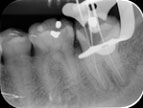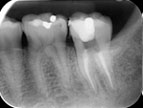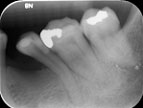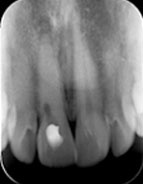- Home
- /
- Our Services
- /
- Root Canal Treatment
Root Canal Treatment
Know more about the Root Canal Treatment procedure
What is Root Canal?
Root canal treatment is a procedure to treat the infection or inflammation of the root canals. It is best summarized as the disinfection of the root canal space and filling up the canals to prevent re-infection. This can be done in one visit or over several visits, depending on the condition of the tooth. Several x-rays are required during the procedure to ensure the quality of the root canal treatment.
Root Canal Treatment Procedure
The root canal treatment starts off with adequate anesthesia. For a painful tooth, usually, the achievement of anesthesia can be more challenging. Experienced endodontists or root canal specialists will explain what is needed for proper anesthesia.
Afterwards, a rubber sheet will be placed so that the tooth can be isolated from the saliva.
This would follow up with an access opening into the root canal space by using rotary burs. Cleaning and shaping of the canals would be carried out using small files and copious irrigation with a disinfection solution. After the canals were adequately cleaned and shaped, the canals are filled up with a filling material (gutta-percha) and biocompatible cement.
The tooth will then need a final restoration which serves as a final seal to prevent reinfection. For posterior teeth, a full-coverage restoration such as a crown will be required to prevent the tooth from fracturing.
 Insertion of the files to confirm that the canals were cleaned and shaped along the whole length of the canals
Insertion of the files to confirm that the canals were cleaned and shaped along the whole length of the canals
 Radiograph of root canals with root canal fillings
Radiograph of root canals with root canal fillings
When Do I Need a Root Canal Treatment?
The main causes of root canal infection are large decay, cracked teeth, trauma and severe gum disease.
The signs and symptoms of root canal infection include:
1. Presence of sensitivity or pain.
Toothaches are a result of pulpitis (inflammation of the pulp). In the mild form of pulpitis, the tooth may be sensitive to cold temperature (eg. cold drinks). There is a chance that this may heal and the pain will subside with appropriate and timely treatment. In a more severe form of pulpitis, thermal changes can induce pain that may linger and affect function. Spontaneous or sudden pain is also a symptom of a more severe root canal infection
2. Gum swelling and/or pus discharge.
When there is an infection of the root canal space, obvious signs such as swelling and sometimes pus discharge from the surrounding gums may emerge.
3. Tooth discolouration
The red blood cells in an infected pulp tissue may release iron molecules during the process of degradation, and this may cause gray or brown discoloration of the tooth. Apart from this, advanced root resorption may cause a light pink spot on a tooth.
However, not all signs and symptoms listed here will be observed in patients themselves. A dentist/dental surgeon or an endodontist (root canal treatment specialist) will be the best person to diagnose your condition.
Benefits of Root Canal Treatment
Root canal treatment can save teeth from extraction. Patients can preserve their teeth without having to resort to extraction and replacement treatment which can be a time-consuming process.
Root canal treatment resolves the pain caused by inflammation in the tooth pulp. The treatment also helps to reduce the risk of oral infection which can result in unwarranted pain and bleeding.
Risks and Complications of Root Canal Treatment
The root canal treatment procedure is common and safe practice. However, like any delicate procedure, there are minor risks involved. Most of the possible complications are limited to the well-being of the tooth or its supporting structures.
Some of the common complications are listed below.
- After completion of root canal treatment, some patients may experience discomfort, mild swelling and pain or sensitivity especially when biting.
- There are aberrations of the tooth anatomy that result in a higher chance of procedural complications which include:
- Calcification of the root canal can render the root canal space undetectable or too small for ease of cleaning. Without proper cleaning of the root canal space, persistent infection may occur.
- Curved canals can cause a higher chance of instrument fracture which may render further cleaning of the canals impossible.
- Premature tooth or tooth with limited tooth structure may fracture during treatment.
When such complications occur, the success rate may be affected and additional follow-up treatment may be required.
 Curved and long canals shown in the radiograph can cause procedural errors
Curved and long canals shown in the radiograph can cause procedural errors
 Calcification causing narrow canals can increase the chance of procedure errors
Calcification causing narrow canals can increase the chance of procedure errors
Overall, complications to a patient’s general health due to root canal treatment are rare. If these complications do arise, it is usually due to the patient’s pre-existing medical condition. If he/she is allergic to certain medications or materials or has any health condition that requires special care, the dentist or endodontist should be informed prior to the treatment.
